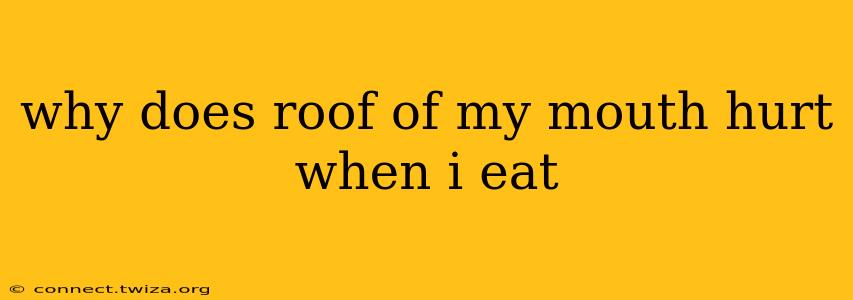A burning, stinging, or aching roof of your mouth during or after eating can be quite unpleasant. This discomfort, medically known as palatalgia, can stem from various causes, ranging from minor irritations to more serious underlying conditions. Understanding the potential culprits is the first step towards finding relief. This article explores common reasons for roof-of-mouth pain after eating and offers guidance on when to seek professional medical advice.
What Causes Roof of Mouth Pain After Eating?
Several factors can contribute to a painful roof of the mouth after eating. These include:
1. Minor Irritations and Injuries:
- Hot Foods and Drinks: This is the most common cause. Scalding your palate with excessively hot food or beverages can lead to immediate and sometimes lingering pain. The damage is usually superficial and heals within a few days.
- Sharp Foods: Eating foods with sharp edges, such as crackers, tortilla chips, or even certain fruits, can cause minor abrasions or cuts on the palate. These injuries can be painful and slow to heal, especially if they become infected.
- Acidic Foods: Highly acidic foods like citrus fruits (oranges, lemons, limes), tomatoes, and some spicy dishes can irritate the sensitive lining of the mouth, causing a burning sensation.
- Dry Mouth: Saliva plays a crucial role in protecting the mouth's lining. Lack of saliva (xerostomia) can leave the palate vulnerable to irritation and pain, especially after eating certain foods.
2. Oral Health Issues:
- Mouth Sores (Aphthous Ulcers): These painful, small ulcers can appear anywhere in the mouth, including the roof of the mouth. While the exact cause is unknown, stress, hormonal changes, and nutritional deficiencies are potential contributing factors. They typically heal within a week or two.
- Canker Sores: Similar to aphthous ulcers, canker sores are small, painful lesions that often appear on the soft tissues of the mouth. They are usually not contagious and will typically heal on their own.
- Oral Thrush (Candidiasis): A fungal infection caused by an overgrowth of Candida yeast, oral thrush can manifest as white patches on the tongue, cheeks, and palate, often accompanied by pain and burning.
- Gingivitis/Periodontitis: While primarily affecting the gums, severe gum disease can sometimes lead to pain radiating to the palate.
3. Underlying Medical Conditions:
- Allergies: Certain food allergies can cause oral reactions, including swelling, itching, and pain in the mouth, including the palate.
- Burning Mouth Syndrome: This condition causes a persistent burning sensation in the mouth, often affecting the palate, tongue, and lips. The cause is often unknown, but it can be linked to hormonal changes, nutritional deficiencies, or nerve damage.
- Vitamin Deficiencies: Deficiencies in certain vitamins, such as B vitamins and iron, can affect the health of the oral mucosa, leading to increased sensitivity and pain.
- Certain Medications: Some medications, particularly those with a drying effect, can contribute to mouth dryness and increase sensitivity to certain foods.
4. Other Potential Causes:
- Ill-fitting Dentures: Dentures that rub or press against the palate can cause irritation and pain.
- Oral Cancer (Rare): Persistent or unexplained pain in the mouth should always be checked by a doctor to rule out more serious conditions. While rare, oral cancer can manifest as a persistent sore or pain.
How Long Does Roof of Mouth Pain Last?
The duration of roof-of-mouth pain varies depending on the cause. Minor irritations from hot food usually subside within a few days. Mouth sores typically heal within 1-2 weeks. However, persistent or recurring pain warrants a visit to a dentist or doctor.
When to See a Doctor or Dentist?
You should consult a healthcare professional if:
- The pain is severe or persistent (lasting more than 2 weeks).
- You have accompanying symptoms like fever, swelling, or difficulty swallowing.
- You notice any unusual sores or lesions in your mouth.
- You suspect an allergic reaction.
This information is intended for general knowledge and does not constitute medical advice. Always consult a healthcare professional for diagnosis and treatment of any medical condition. They can properly assess your specific situation and provide appropriate recommendations.
